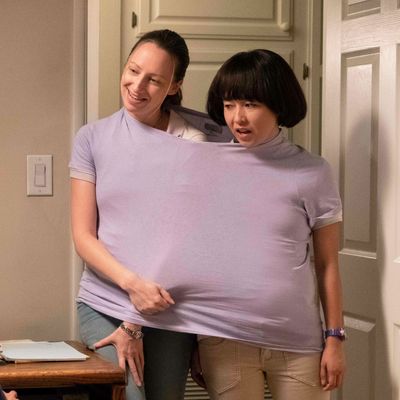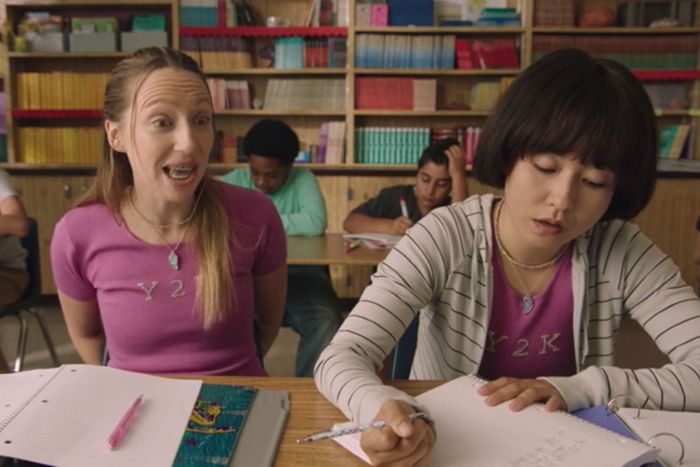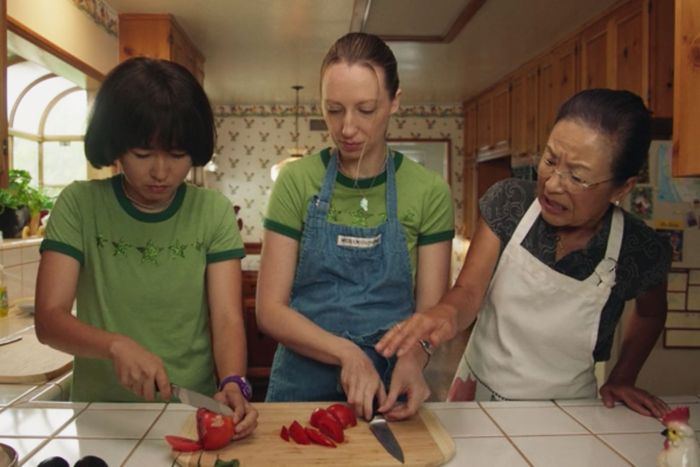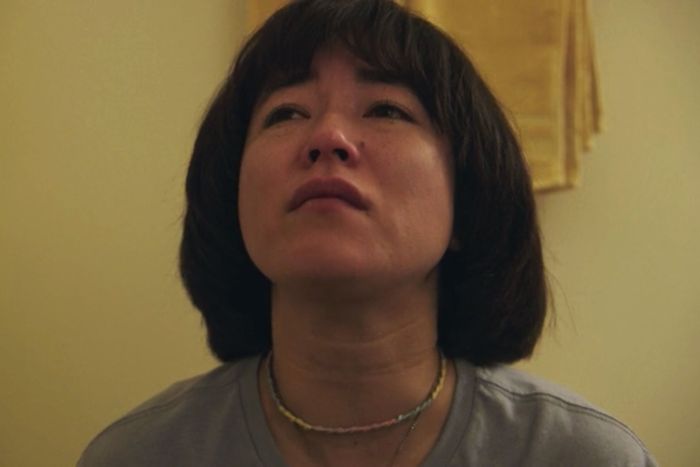
It’s very teenage to declare — all hyperbole, zero irony — that your life is about to change forever. Endless hours are devoted to hyping yourself up for these supposedly major moments, getting worked into a frenzy for something that often turns out to be a nonevent: a party that’s a bust, a kiss that feels like nothing. And then the stuff that actually, irrevocably changes your life comes in some startling way, from an unexpected angle, and is all the more scarring because of it.
Hulu’s PEN15, which chronicles the 2000s-era best friendship of Anna Kone and Maya Ishii-Peters (played by 32-year-old co-creators Anna Konkle and Maya Erskine), is both a totally absurd and excruciatingly realistic depiction of that stretch of adolescence. I know as many millennial friends who’ve devoured it, delighting in its period accuracy — the high-rise thongs whale-tailing out of low-rise jeans! The eerr-EERRAH-erNERRGH sounds of dial-up internet! — as those who were too physically pained by memories of full-body awkwardness to make it through the first episode.
Konkle and Erskine, along with writer Stacy Osei-Kuffour, are nominated for an Emmy for outstanding writing for a comedy series, PEN15’s first nod in a stacked category that also includes Barry, Fleabag, The Good Place, Russian Doll, and Veep. The honored episode is “Anna Ishii-Peters,” the second-to-last installment of the season. It’s not quite a bottle episode, but it has that same intensity and claustrophobia, as what starts as a best friends’ shared fantasy — back-to-back sleepovers on a school night while Anna’s parents are away — devolves into disaster. Both girls, unbeknownst to each other, are going through something seismic and life-altering: Anna’s parents have left for a “couples’ retreat” that will end in their decision to get a divorce, and Maya is getting her period for the first time.
“I would say from the beginning, when we were writing it, we knew it would be slightly dramatic and there would be a horror element,” Erskine told Vulture. Tension builds and builds and builds, and then “it turns into this horror thriller.” Below, Erskine and Konkle break down how they plotted out the episode’s emotional beats, scene by scene.
The Origin of ‘Anna Ishii-Peters’
The premise of the episode came from pairing a memory of Konkle’s with one of Erskine’s. Konkle, whose parents divorced when she was the same age as her PEN15 character, remembered staying at her best friend’s house all the time. “I fantasized about turning into that second daughter in their family,” Konkle said.
As for Erskine, “I felt very jealous of the connection my best childhood friend had with my mom.”
“There was something on both sides of that experience, for the girl whose house it is and the girl visiting the house,” Erskine said. “How that can be the best thing in the world for the first 24 hours, how it can quickly devolve into jealousy, invasion of privacy, losing boundaries, and how that can erupt into a big fight.”
To get to that massive blowup, they knew they needed to start with heightened, almost smothering intimacy. Anna and Maya are so physically and psychically close to each other in the episode that, for long stretches of time, they’re either wearing identical outfits or stretching out a single T-shirt they’ve squeezed into together. The sleepover starts with a montage set to the Cranberries’ “Dreams,” with Anna and Maya basking in their uninhibited togetherness. They’re all over each other in that way of girls at that age, before a late-teenage intermission of self-consciousness makes goofy, guileless touching feel awkward.
“We actually filmed a lot more in the montage sequence of joy,” Erskine said, and in the original writing, it was “a lot wackier.” In editing, though, after they saw co-creator Sam Zvibleman’s direction, “it became a lot more emotional. [We] realized, Oh, this is a love story! It’s pure joy, pure unabashed love for each other. As an adult, it’s so rare that you get to express that.”
Creating a ‘Twisted Love Triangle’
“I avoided my house when my parents were fighting,” Konkle said. “I went to my friend’s house. And you can’t help but fantasize about, What if I was part of this family?” In the episode, Anna’s stay at the Ishii-Peters residence is a chance to cosplay as the kid in “this more traditional family unit,” Konkle said, where she can have “normal” experiences: an older brother to tease, a sister to play with, and parents who get along.
“We wanted to play with Anna not having a sibling,” Erskine said. “What’s that like, when you’re sleeping over? It’s almost sexy! It’s almost exciting for Anna to be like, Let’s hang out with your brother. For Maya, that’s every other day. So the jealousy starts to form there. Like, Anna is trying to hang with my brother over me.”
Does Anna lean into her life with the Ishii-Peters as hard as she does because she knows, on some level, that her parents are about to divorce? “At that age, it’s almost so overwhelming, what is happening for Anna at home, that I don’t know if she can put words to it yet,” Konkle said. “On some subconscious level, she knows what is going to happen with her parents. [It’s] that feeling of, Is that other shoe going to drop? There was always a paranoia.” Still, while Anna has “been privy to their fighting,” the divorce bomb is meant to be a shock.
Maya doesn’t have any of this context, though, and the gusto with which Anna ingratiates herself into the Ishii-Peters family leaves Maya feeling adrift and replaced. This is both crushing and hilarious, as Maya’s efforts to elbow her way back into the action get increasingly desperate. (When her brother teases Anna for farting, Maya cries out, “I HAVE A BIG HOLE IN MY BUTT. I POOP A LOT OUT OF IT. YOU GUYS JUST DON’T REALIZE IT. I’M THE SMELLIEST SHIT THERE EVER WAS.”)
During a family-dinner scene, Erskine said, “it starts to turn sour.” Maya’s dad, Fred, compliments Anna’s singing skills, which leads to the two of them scatting together — truly the most embarrassing form of singing, even when done well — and just as they’re vibing, Maya forces her way in and word-vomits some aggressive scatting of her own that goes totally off the rails. “It starts to turn a little into a horror movie at that point.”
Woven through all of this are little moments of Yuki, Maya’s mom (played by Erskine’s real mother, Mutsuko Erskine), tending to Anna. Yuki has clocked that Anna needs a maternal figure and is eager to provide the care she senses Anna isn’t getting at home. But from Maya’s perspective, her mom is being nicer to her friend that she is to her own kid: bandaging a finger that Anna stapled (on purpose, for attention), running Anna a bath, eventually brushing Anna’s hair just before the sleepover comes to its emotionally violent conclusion.
Maya is feeling so abandoned and replaced that she briefly hallucinates Anna with long dark hair. That is, as Maya 2.0., the daughter who is actually worthy of her mother’s affection. For that shot, the first wig Konkle tried on was a bowl cut, just like Maya’s. “But she looked too much like Lord Farquad from Shrek,” Erskine said, so they swapped in a long wig instead. “Which is so perfect! Because Maya doesn’t even need brushing anymore, because her hair is a fucking one-inch mop. It was also symbolizing this other part of innocence and beauty that she doesn’t have, but Anna does have.”
“There was always that crescendo with the wig, and that was always intended to be kind of eerie,” Konkle said. “It just started to go in that direction, in the writing, and then Sam took it to another level.”
“It’s this love story between Anna, the mom, and Maya. A love triangle,” Erskine said. “Which is very twisted.”
There Will Be ‘Clumpy’ Blood
Konkle and Erskine knew they wanted Maya to get her period “at the climax of the season,” since it’s “literally a loss of childhood,” Konkle said. “It was a good place to continue the story lines we’d begun of Maya’s loss of innocence and feeling like she was getting away from her family.”
By the end of the episode, Maya is feeling so displaced and enraged that she lashes out at Anna, telling her to “go back to your own fucking family.” Yuki, as you might expect, is dismayed by her daughter’s behavior and chastizes her for her immaturity: “You’re not a little girl anymore.” Maya bolts to the bathroom, where she discovers that she’s just gotten her first period.
This might seem too on-the-nose, even for a fictional comedy, except for the fact that it actually did happen to Erskine.
“I was very close with my mom,” Erskine said. “I’d sleep in the same bed as her. One night we had a fight and she was like, ‘You need to sleep in your own bed. You’re not a little girl anymore.’”
Erskine was “crushed,” she remembered. “It felt like my first heartbreak. Someone telling me, ‘You need to be on your own now.’ And the next morning, I woke up and got my period.”
“It was devastating,” she went on. “I was singing, by myself, in the alleyway, a sad, dramatic, [Britney Spears voice] “I’m not a giiiiirl,” crying about it to myself.”
Perhaps some girls, like Judy Blume heroines, might brag about having their periods and being closer to adulthood than their peers. But not Erskine. “I lied about it for a year to everyone. I felt so much shame. Looking back now in hindsight, it was traumatizing. It was coming on the heels of being told I’m not a little girl anymore, which signified, You don’t love me as much. It weirdly instilled in me: When you’re a little girl you’re able to be loved by your parents, but when you’re a woman, you get sent to an island to stuff toilet paper up your crotches, and you’re left to bleed and die there.”
When Konkle learned about Erskine’s real-life experience, “I was just so blown away by that, and by your ability to look at it as clearly as you did, which then allows us to write about it. If you don’t mine for it at all, there’s nothing to write.”
“And,” she added, “it was really exciting to see the blood!” (Erskine, delighted: “It’s CLUMPY.”)
In a world of pad commercials that suggest period blood is the smooth, translucent blue of laundry detergent, Erskine and Konkle were thrilled “to be like, Let’s just see it,” Konkle said. “It didn’t feel gratuitous to me. It felt like part of the story.”
That ‘Especially Devastating’ Ending
Building to the episode’s conclusion was a challenge, Konkle and Erskine said. How could they show, “quickly and authentically,” the way that Yuki’s treatment of Anna led to Maya’s explosion? And how could they do it without making Maya seem like a villain?
The solution came in splitting the characters up, just as they reached their most vulnerable moments. While Maya is shouting at Anna to get out, Anna’s parents arrive. They pick her up, drive her home, and tell her they’re getting a divorce. During the shooting of that scene when Anna’s parents break the news, Erskine said, “I didn’t even want to be near set. It felt very heightened emotionally. All of our senses were so acute.” When she watched it back, for the first time in making the show, Erskine didn’t have any notes or suggestions. “It was so perfect. It could have easily become this saccharine scene, and it was just more than I could ever want.”
The episode then jumps back into the Ishii-Peters home, where Maya sobs in her mother’s lap while her mom strokes her back and sings “an old Japanese folk lullaby.” The scene is quite tender and moving, but Erskine remembers filming differently: “Having to do an emotional scene with my mom just made me angry. I was just like, You’re touching me too much.”
By the time Anna calls Maya to tell her what happened, Maya has fallen asleep in bed next to her mom. So Anna calls up Heather, a popular girl and fellow daughter of divorce, deepening the rift between the once-inseparable best friends. The episode ends with both Anna and Maya dealing privately with their heartache, yearning for but also making do without the one person they usually rely on the most.
“That’s really heavy stuff, and it’s the first age you start dealing with those feelings in a more intense way,” Konkle said. “To not have your friend by your side for that, we thought would be especially devastating.”




